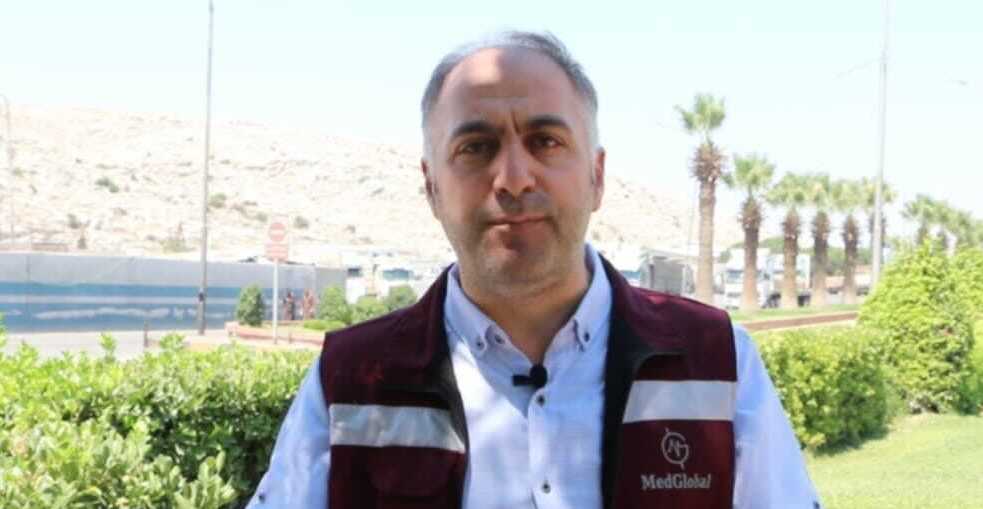"We are exhausted and desperate amid severe shortages in oxygen and hospital beds."
My name is Dr Moustafa Aleado and I’m a pharmacist in Idlib, where I lead a team of medical workers providing home health services to civilians across northwest Syria amid the worst surge of COVID cases since the pandemic started. As I’m writing this, very sick patients are standing in queues at the hospitals waiting for someone to die or get released so they can get a bed.
The first thing I do when I get to my office is check in with my colleagues who have started providing home care to COVID patients in Ariha in southern Idlib. Ariha is near the frontlines and all the hospitals there were either destroyed by deliberate attacks or evacuated to escape the bombs. The area has been reporting scary numbers of COVID and thousands of people can’t make the long journey to the nearest hospital – not least because Ariha is still being shelled almost every day by the regime forces.
Everyday we receive around 100 calls asking for home visits. My colleagues in Ariha visit people throughout the day to treat those with mild to moderate symptoms, and then refer critical cases or those with low oxygen levels to hospitals.
Around midmorning I will visit our team in Idlib city. Recently our team started helping to ease the pressure on hospitals in Idlib city and we opened an isolation center to triage patients we suspect have COVID-19. There are around 2000 new positive cases a day in Idlib, but the number is probably much higher as we have limited testing capacity. We are growing more and more distressed as there has been little additional support from the World Health Organization in response to this surge and doctors desperately need oxygen and vaccines.
There are only two hospitals in Idlib city that are equipped to treat COVID patients, with ICU beds and ventilators. They serve over a million people and all the beds are fully occupied, so our new isolation center is helping with 50 extra beds for less severe cases. If new arrivals test positive we give them a room to quarantine in, unless they show severe symptoms and need to go to hospital. If they test negative we send them back home.
The surge in cases and the severe shortages of oxygen and hospital beds have left us helpless and terrified that people will die in their homes without the care they need, like last year in Italy and France. Idlib city only has 40 ventilators, and in the whole northwest there are only 156. At least 10% of cases need a hospital bed, and 5% an ICU, so every day around 100 new people are in need of an ICU or ventilator … you do the math.
A few days ago, a young girl died in a hospital hallway because all the ventilators were occupied. Most of the time new patients have to wait for someone to die so they can take their place. It’s heartbreaking, and people who are suffering from heart disease or cancer simply aren’t getting adequate treatment.
Towards late morning, I reach out to my colleagues at MedGlobal and other local health organizations to desperately try and get more oxygen and supplies for our patients. With the lack of support from the WHO, local health organizations are trying to come up with solutions to the severe shortages, like bringing oxygen in from Turkey or even building an oxygen generator, but it’s logistically difficult and time consuming. We don’t have that luxury, we need oxygen right now to save lives.
As I walked back home today, my neighbour, an elderly woman, stopped me crying and asked if I could help her get an oxygen tank for her very sick brother. He can’t find a place at a hospital. I didn’t know what to tell her but I promised to do everything I could to find a bed for her brother at our center in Idlib city.
I anticipate that we haven’t reached the peak of this surge yet, and cases and deaths will keep increasing in the coming weeks. All the hospitals in northwest Syria combined have fewer beds and staff than a single European hospital, but we’ve still not seen enough response from the World Health Organization or international donors to this catastrophe. We urgently need oxygen, medical supplies, and vaccines to face this pandemic and save lives.
By the end of the day I am exhausted. My heart breaks for my colleagues who are also exhausted. COVID-19 has impacted our already weakened healthcare system and our lives in an indescribable way and we don’t have reliable authorities to help us impose lockdown and safety measures. I am in awe of my team and all health workers in the northwest, but we don’t have the capacity to face this pandemic alone.

Dr Moustafa Aleado is a program manager for MedGlobal, and the former vice director of Idlib Health Directorate.